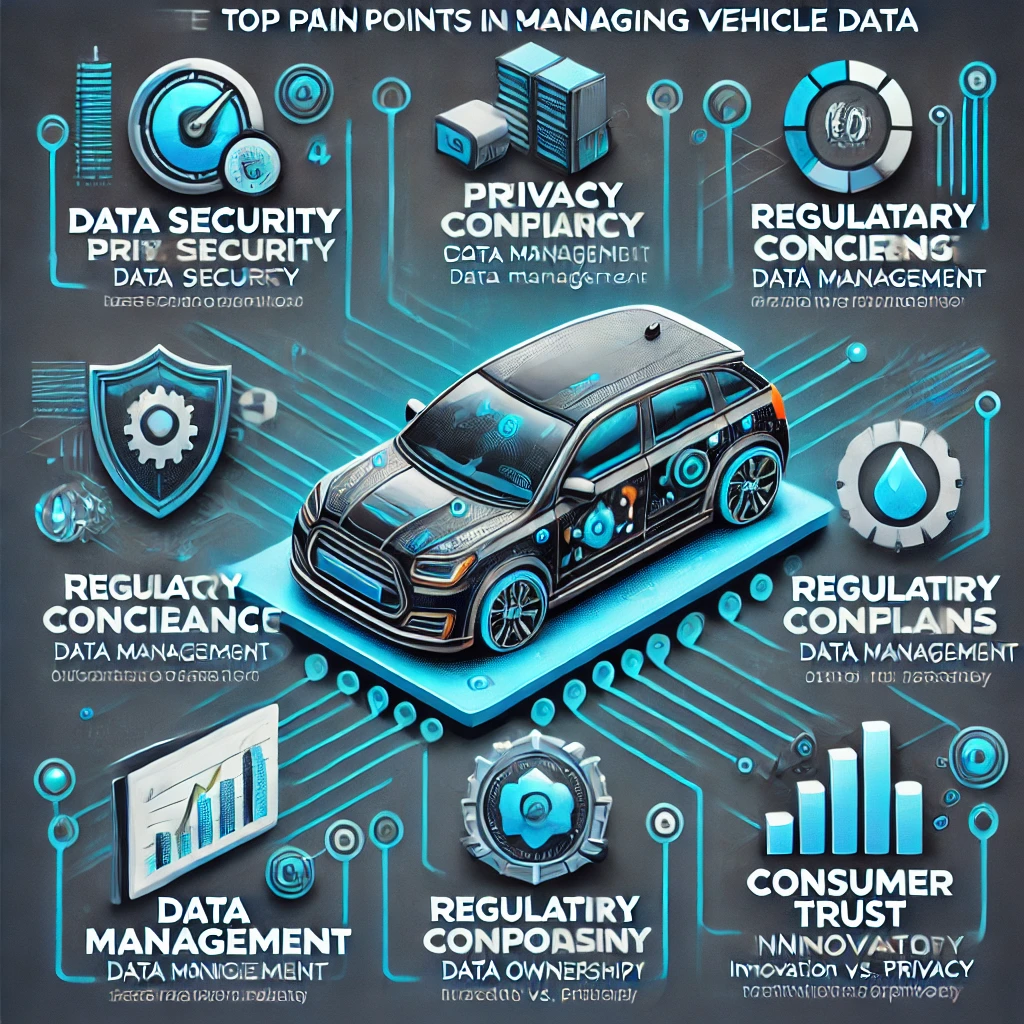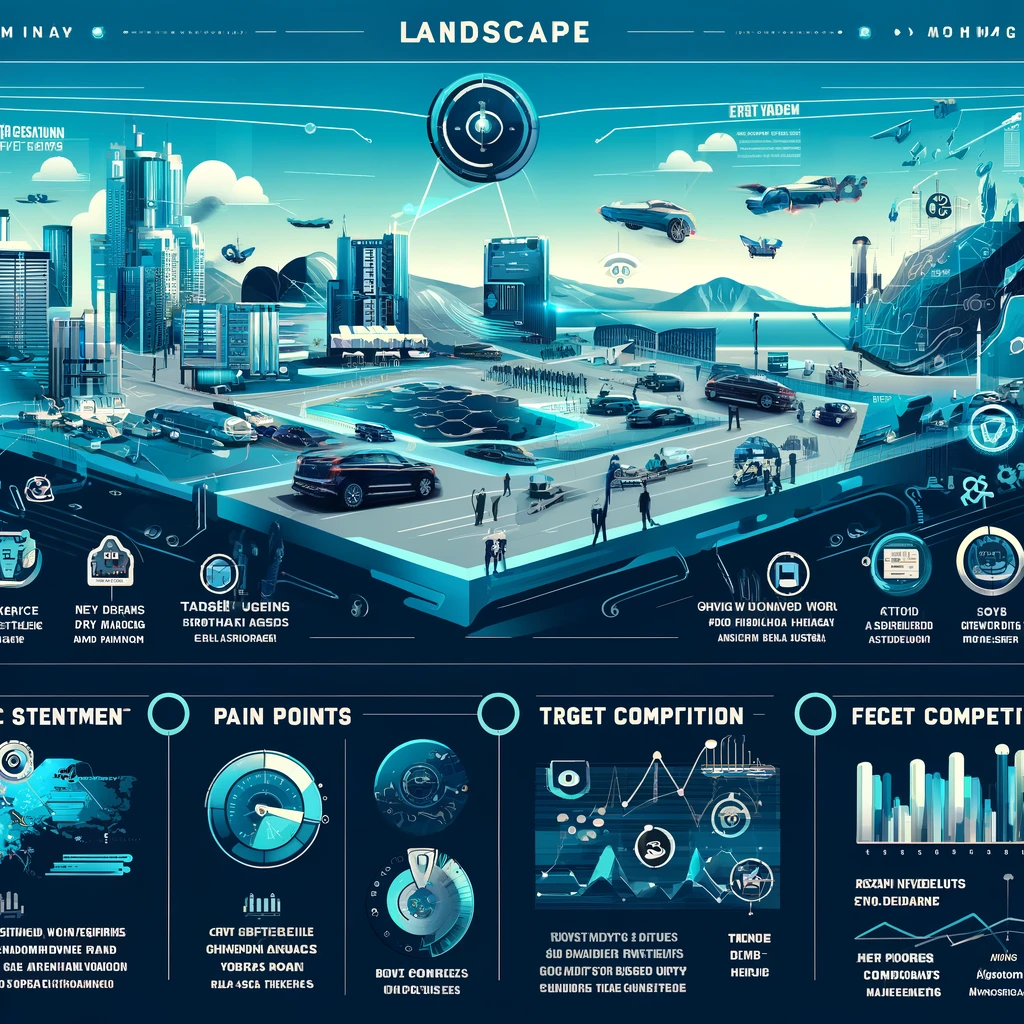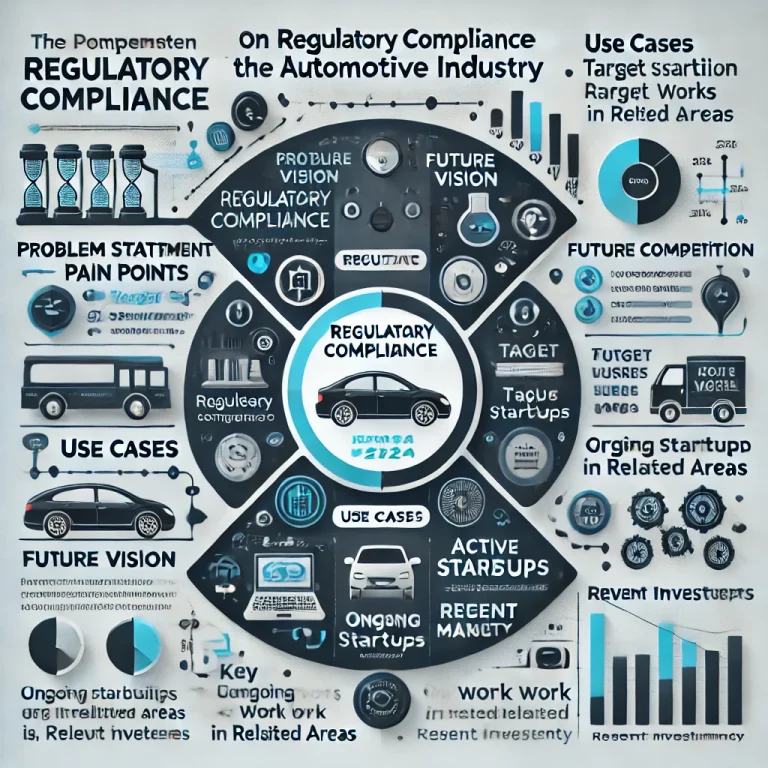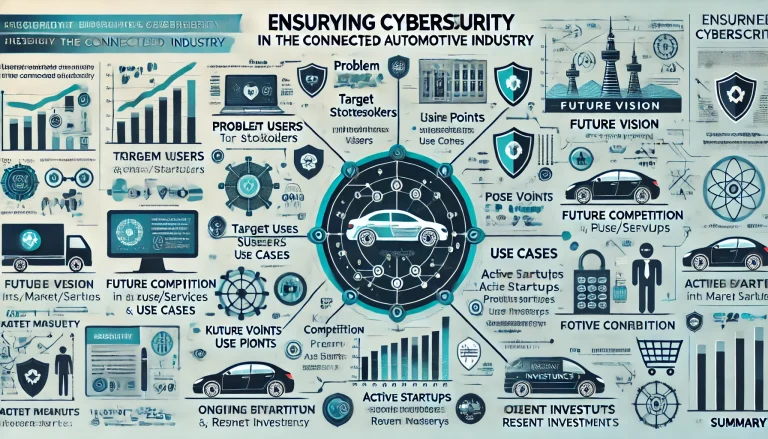Problem Statement
Modern vehicles generate vast amounts of data, which can be used to enhance vehicle performance, provide personalized services, and improve safety. However, managing this data responsibly is a significant challenge. Ensuring data security, privacy, and compliance with regulations while leveraging data for innovation is crucial for maintaining consumer trust and competitive advantage.
Pain Points
- Data Security: Protecting vehicle data from cyber threats and unauthorized access.
- Privacy Concerns: Ensuring the privacy of personal data collected from vehicles.
- Regulatory Compliance: Navigating complex data protection regulations globally.
- Data Management: Efficiently storing, processing, and analyzing vast amounts of data.
- Consumer Trust: Maintaining transparency and building consumer trust in data practices.
- Cost: High costs associated with implementing robust data security measures.
- Interoperability: Ensuring different data systems and devices work seamlessly together.
- Scalability: Scaling data infrastructure to handle increasing volumes of vehicle data.
- Data Ownership: Clarifying who owns the data generated by vehicles.
- Innovation vs. Privacy: Balancing the use of data for innovation while respecting privacy concerns.

Future Vision
The future vision for managing vehicle data involves creating a secure and transparent ecosystem where data is responsibly collected, stored, and utilized. Advances in encryption and cybersecurity technologies will be crucial in protecting data. Regulations will evolve to provide clearer guidelines on data privacy and ownership, fostering consumer trust. Companies will develop sophisticated data analytics platforms to extract valuable insights while ensuring compliance with privacy standards. Collaboration between automotive manufacturers, tech companies, and regulators will be key to building a balanced approach that leverages data for innovation without compromising security and privacy.
Use Cases
- Predictive Maintenance: Using data to predict and prevent vehicle malfunctions.
- Personalized User Experiences: Customizing in-car services based on driver preferences and behavior.
- Safety Enhancements: Analyzing data to improve vehicle safety features and protocols.
- Traffic Management: Leveraging vehicle data to optimize traffic flow and reduce congestion.
- Insurance: Using driving data to offer personalized insurance premiums.
- Fleet Management: Optimizing fleet operations using real-time data analytics.
- Infotainment Systems: Providing tailored content and services in-vehicle based on user data.
- Vehicle Performance Optimization: Analyzing data to enhance vehicle performance and efficiency.
- Regulatory Compliance: Using data to ensure compliance with emissions and safety regulations.
- Consumer Feedback: Collecting and analyzing data to understand consumer preferences and improve products.
Target Users and Stakeholders
User: Automotive Manufacturers, Technology Providers, Fleet Managers, and Regulators
Age Group: 30-60 years
Gender: All genders
Usage Pattern: Continuous use for data management, analysis, and regulatory compliance
Benefit: Enhances vehicle performance, safety, and user experience while ensuring data security and privacy
Stakeholders
- Automotive Manufacturers: Collecting and utilizing vehicle data for innovation.
- Technology Providers: Developing data management and security solutions.
- Consumers: Providing data and benefiting from personalized services.
- Regulators: Setting and enforcing data protection regulations.
- Cybersecurity Firms: Protecting vehicle data from cyber threats.
- Insurance Companies: Using vehicle data to offer personalized insurance plans.
- Fleet Management Companies: Optimizing fleet operations using data analytics.
- Telecommunications Providers: Ensuring connectivity for data transmission.
- Data Analytics Firms: Analyzing vehicle data for actionable insights.
- Legal Firms: Advising on data privacy and compliance issues.

Key Competition
- Tesla: Leading in vehicle data utilization and security.
- Google (Waymo): Innovating in data-driven autonomous vehicle technology.
- Apple: Developing secure and private in-vehicle data systems.
- Bosch: Providing comprehensive data management solutions.
- Intel (Mobileye): Advancing data analytics for autonomous driving.
Products/Services
- Data Management Platforms: Solutions for storing, processing, and analyzing vehicle data.
- Cybersecurity Solutions: Protecting vehicle data from unauthorized access and cyber threats.
- Data Privacy Tools: Ensuring compliance with data protection regulations.
- Predictive Analytics: Tools for predictive maintenance and performance optimization.
- Connected Car Services: Offering personalized in-car services based on user data.
Active Startups
- Otonomo: Providing data services for the connected car ecosystem.
- Carmera: Specializing in real-time data for autonomous vehicle navigation.
- Metromile: Using driving data for pay-per-mile insurance.
- Nauto: Offering AI-powered fleet management solutions.
- Ridecell: Providing data-driven mobility solutions for fleets.
- CerebrumX: Leveraging AI for connected vehicle data analytics.
- Wejo: Aggregating and analyzing vehicle data for various applications.
- AutonomouStuff: Developing data solutions for autonomous vehicles.
- Sibros: Providing data management and analytics platforms for connected vehicles.
- Mojio: Offering connected car services and data analytics.
Ongoing Work in Related Areas
- AI and Machine Learning: Enhancing data analytics capabilities.
- Blockchain: Securing vehicle data transactions.
- Edge Computing: Processing data closer to the source for real-time analytics.
- 5G Connectivity: Improving data transmission speeds and reliability.
- Cybersecurity: Developing robust measures to protect vehicle data.
- Data Privacy Regulations: Evolving laws and standards for data protection.
- Predictive Maintenance: Using data to predict and prevent vehicle issues.
- Smart Cities: Integrating vehicle data for better urban planning.
- Vehicle-to-Everything (V2X): Enhancing data communication between vehicles and infrastructure.
- Sustainable Transportation: Using data to optimize fuel efficiency and reduce emissions.
Recent Investment
- Tesla: Invested $1 billion in data analytics and security in 2023.
- Google (Waymo): Allocated $800 million for autonomous vehicle data management in 2022.
- Apple: Committed $600 million to develop secure in-vehicle data systems in 2023.
- Bosch: Invested $500 million in data management solutions in 2022.
- Intel (Mobileye): Directed $700 million towards data analytics for autonomous driving in 2023.
Market Maturity
The market for vehicle data management is rapidly maturing, driven by advancements in data analytics, cybersecurity, and connectivity technologies. Companies are investing heavily in developing secure and scalable data solutions to leverage the vast amounts of data generated by modern vehicles. Regulatory developments are providing clearer guidelines for data privacy and protection, fostering consumer trust. The integration of AI, 5G, and edge computing is enhancing the capabilities of data analytics platforms, making the automotive data ecosystem more robust and efficient.
Summary
Modern vehicles generate vast amounts of data that can significantly enhance vehicle performance, provide personalized services, and improve safety. However, managing this data responsibly poses several challenges, including ensuring data security, protecting privacy, and complying with complex regulations. Maintaining consumer trust while leveraging data for innovation is crucial for the automotive industry.
Key pain points include data security, privacy concerns, regulatory compliance, and the high costs associated with robust data management. Leading companies like Tesla, Google (Waymo), and Apple are at the forefront of developing secure and efficient data solutions, while startups such as Otonomo and Carmera are driving innovation in this space.
The future vision for vehicle data management involves creating a secure and transparent ecosystem that responsibly collects, stores, and utilizes data. Advances in encryption, cybersecurity, and data analytics will be crucial in protecting data and extracting valuable insights. Collaboration between automotive manufacturers, tech companies, and regulators is essential to balance innovation with privacy concerns.
The market for vehicle data management is maturing rapidly, with significant investments driving its growth. Companies are focusing on developing secure, scalable, and compliant data solutions to maintain consumer trust and stay competitive in the evolving automotive landscape.


